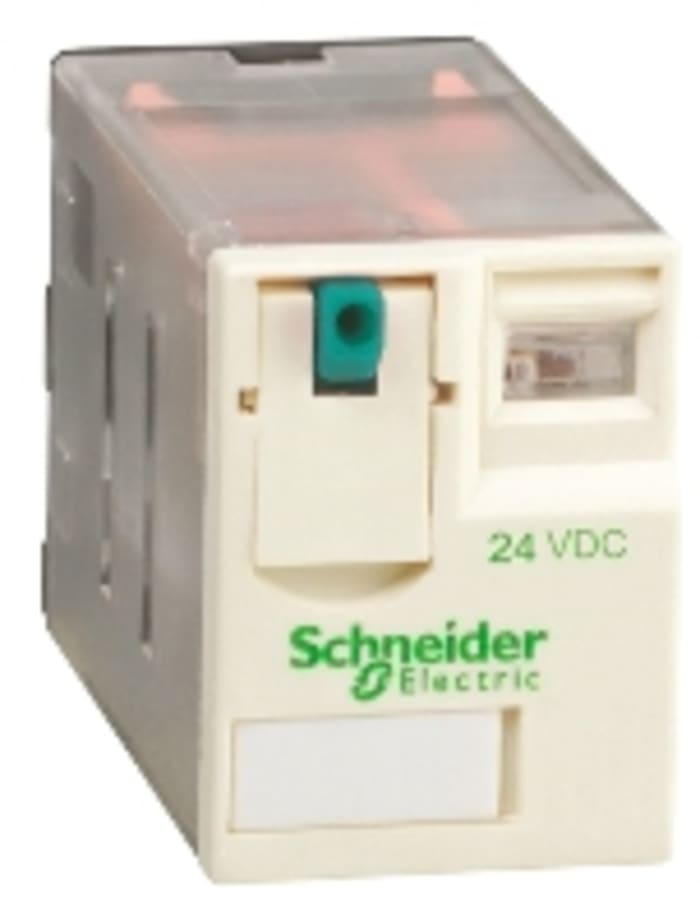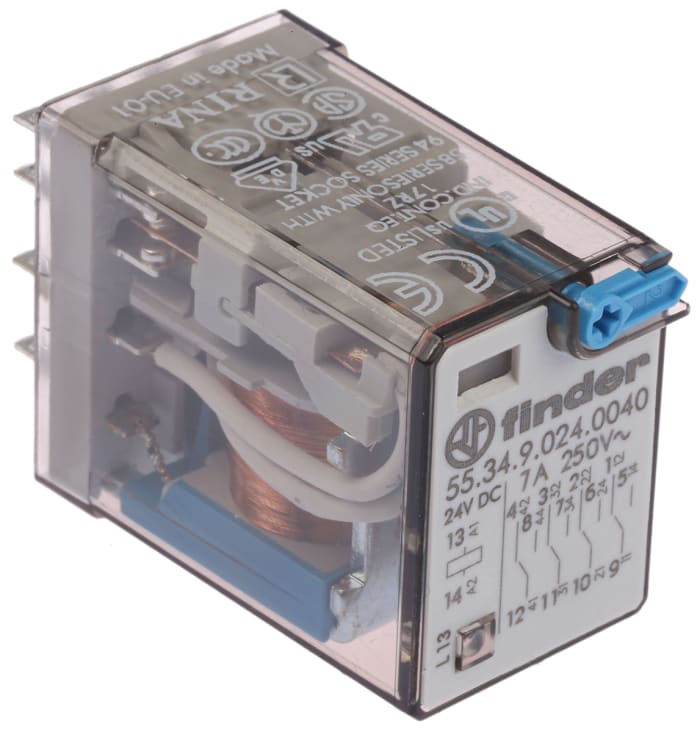Schneider Electric Plug In Power Relay, 24V dc Coil, 8A Switching Current, 4PDT

Technical Document
Specifications
Brand
Schneider ElectricCoil Voltage
24V dc
Contact Configuration
4PDT
Mounting Type
Plug In
Switching Current
8A
Number of Poles
4
Latching
No
Terminal Type
Plug In
Maximum Switching Voltage AC
250V
Maximum Switching Voltage (AC)
250V
Length
21mm
Coil Resistance
650Ω
Coil Power
900mW
Series
RXM
Maximum Operating Temperature
+55°C
Depth
47.7mm
Minimum Operating Temperature
-40°C
Life
100000 cycles
Contact Material
Silver Alloy
Standards Met
CE, CSA, EN/IEC, GOST, Lloyd's, REACH, RoHS Compliant, UL
Better World Product (Find out more)
Yes
Better World Verification
Green Premium
Height
27mm
Maximum Switching Power DC
168 W
Maximum Switching Power AC
1.5 kVA
Country of Origin
China
Product details
Schneider Electric Miniature Relays - RXM Series
Introducing Schneider Electrics compact RXM miniature relays with LED. They are often used to increase the functions in electrical enclosures, predominantly for industrial applications (machine/building equipment and HVAC). These relays can be referred to as an electromechanical relay or an industrial switch.
Features & Benefits
- Easy to install and programme, integration into current devices is also easy and they have the functionality to be adapted for all voltages
- Simple to use with no adjustments required for standard applications
- Each miniature relay from the RXM range features a test button and mechanical indicator of the relay status
- If you are looking for a base for assembly on to a DIN rail or with screws these need to be ordered separately
- Robust and hard-wearing
- Compact in design and in size
What is a non-latching relay and how do they work?
A relay is an electrical switch that is operated by electrical pulses, their primary function is to open and close a circuit. When power passes through a circuit, a relay switches position (usually from NC to NO) using an internal coil which generates a magnetic force. This force then holds the relay in a NO position, when the current is switched off the relay returns to the NC position. This function is what makes these non-latching relays perfect for push-button applications such as keyboards and micro-controller input buttons.

Stock information temporarily unavailable.
Please check again later.
SR 64.73
Each (ex VAT)
SR 74.44
Each (inc. VAT)
1
SR 64.73
Each (ex VAT)
SR 74.44
Each (inc. VAT)
1

Technical Document
Specifications
Brand
Schneider ElectricCoil Voltage
24V dc
Contact Configuration
4PDT
Mounting Type
Plug In
Switching Current
8A
Number of Poles
4
Latching
No
Terminal Type
Plug In
Maximum Switching Voltage AC
250V
Maximum Switching Voltage (AC)
250V
Length
21mm
Coil Resistance
650Ω
Coil Power
900mW
Series
RXM
Maximum Operating Temperature
+55°C
Depth
47.7mm
Minimum Operating Temperature
-40°C
Life
100000 cycles
Contact Material
Silver Alloy
Standards Met
CE, CSA, EN/IEC, GOST, Lloyd's, REACH, RoHS Compliant, UL
Better World Product (Find out more)
Yes
Better World Verification
Green Premium
Height
27mm
Maximum Switching Power DC
168 W
Maximum Switching Power AC
1.5 kVA
Country of Origin
China
Product details
Schneider Electric Miniature Relays - RXM Series
Introducing Schneider Electrics compact RXM miniature relays with LED. They are often used to increase the functions in electrical enclosures, predominantly for industrial applications (machine/building equipment and HVAC). These relays can be referred to as an electromechanical relay or an industrial switch.
Features & Benefits
- Easy to install and programme, integration into current devices is also easy and they have the functionality to be adapted for all voltages
- Simple to use with no adjustments required for standard applications
- Each miniature relay from the RXM range features a test button and mechanical indicator of the relay status
- If you are looking for a base for assembly on to a DIN rail or with screws these need to be ordered separately
- Robust and hard-wearing
- Compact in design and in size
What is a non-latching relay and how do they work?
A relay is an electrical switch that is operated by electrical pulses, their primary function is to open and close a circuit. When power passes through a circuit, a relay switches position (usually from NC to NO) using an internal coil which generates a magnetic force. This force then holds the relay in a NO position, when the current is switched off the relay returns to the NC position. This function is what makes these non-latching relays perfect for push-button applications such as keyboards and micro-controller input buttons.



